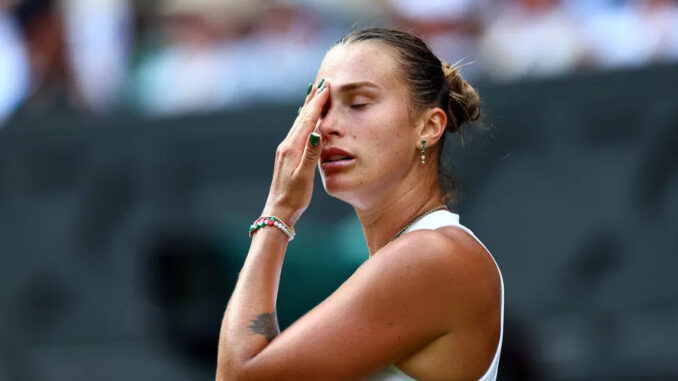
Aryna Sabalenka, the world’s No. 1 women’s tennis player, stands at the pinnacle of the sport, wielding a ferocious game that has secured her three Grand Slam titles and a commanding presence on the WTA Tour. Yet, beneath her powerful forehands and unrelenting drive lies a story of vulnerability and resilience that nearly saw her walk away from tennis altogether. In a candid interview following her semifinal run at Wimbledon 2025, the 27-year-old Belarusian revealed a dark moment in 2022 when she contemplated quitting the sport she now dominates, admitting, “We truly tried everything to fix my serve and nothing worked. I thought maybe it was a sign to quit and do something else.”
The year 2022 was a crucible for Sabalenka, marked by a crippling serve crisis that threatened to derail her career. Known for her thunderous groundstrokes, she struggled with the yips, a psychological block that led to an astonishing 440 double faults across 55 matches, including 18 and 21 in consecutive matches in Adelaide. “A lot of tennis is in your head,” Sabalenka reflected, describing the emotional toll of those days. “You’re always talking to yourself and dealing with emotional moments.” The frustration was palpable as she broke down in tears on court, even resorting to underarm serves in a desperate bid to regain control. The weight of her struggles, compounded by personal challenges and geopolitical tensions surrounding Belarus’s role in the Russia-Ukraine conflict, pushed her to the brink. She felt isolated, misunderstood, and ready to abandon her racket for good.
But Sabalenka’s story is not one of surrender. Drawing strength from her late father, Sergey, a former ice hockey player who introduced her to tennis at age six, she refused to give up. “The way he raised me, he always told me that you have to fight. You have to work hard,” she recalled, her voice carrying the weight of his lessons. Instead of quitting, she doubled down, working with a biomechanics expert after the 2022 Canadian Open to overhaul her serve. The results were transformative: by 2024, she ranked third in the WTA for aces (307) and seventh in service points won (62.7%). “It was such a long process,” she said, “but it ended up being a turning point for me. I stayed with it, worked even harder, and mentally, I found myself.”
Her perseverance paid off spectacularly. Since that low point, Sabalenka has claimed three majors—the 2023 and 2024 Australian Opens and the 2024 US Open—along with nine WTA 1000 titles. Her journey from near-retirement to world No. 1 is a testament to her mental fortitude and the support of her team, including coach Anton Dubrov and fitness trainer Jason Stacy. “It’s very important to have the right people around you, especially during those moments,” she emphasized. “It’s all about support.” This network helped her navigate not only technical challenges but also personal tragedies, like the loss of her father in 2019 and the sudden death of her ex-partner, Konstantin Koltsov, in 2024.
Sabalenka’s 2025 season has been a mix of brilliance and setbacks. Despite reaching the Wimbledon semifinals and the French Open final, where she fell to Coco Gauff, she has yet to secure a major this year. Her fiery competitiveness sometimes spills over, as seen in her controversial French Open press conference, where she attributed her loss to errors rather than Gauff’s play. She later apologized, showing growth in handling defeat. “I just don’t want to face that hate again,” she said after her Wimbledon loss to Amanda Anisimova, laughing off her earlier misstep. “Every time I was close to completely losing it, I kept reminding myself that’s not an option.”
Beyond the court, Sabalenka envisions a future that balances her fierce ambition with personal dreams. She hopes to start a family, inspired by her father’s work ethic. “I want my baby to see me working hard, working hard for something,” she shared, her tiger tattoo—a tribute to her father’s fighting spirit—a constant reminder of her roots. As she prepares for the US Open, where she’s a favorite to add a fourth major, Sabalenka’s journey resonates as a powerful narrative of resilience. From a moment when “nothing worked” to inspiring millions with her refusal to quit, she embodies the mantra she lives by: “My dream is to inspire people, to be a fighter, and to be an example of not giving up and going through whatever life throws at me.”
Leave a Reply